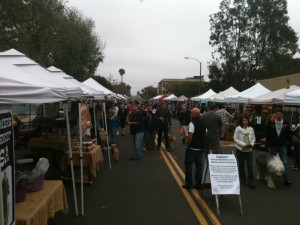
I was recently hired to help manage our local farmer’s market in our neighborhood of Golden Hill. Living as part of a church community who is taking seriously the task of engaging deeply in our neighborhood and city, I figured this gig had the potential to be a brilliant opportunity. Not only has it provided some much needed income, it has reaffirmed the Kingdom value of critical consumption. In a culture of big box stores with products being produced and shipped to us from all corners of the world, working at the farmer’s market has made clear three reasons our consumption has the potential to have a positive Kingdom impact:
1. Builds Community
It’s hard to express the beauty of rolling out of bed (other than the fact than it is 4:45am) and walking three blocks to work. There’s something sacred about walking past our car and taking a deep breath of fresh air. As the market opens, the neighborhood begins to roll out of bed, grab their coffee and stroll down to check out the past week’s produce harvest and listen to some live bluegrass. Between trying to wake up and the contagious buzz of community, no one is in a rush. By the time the market closes, I have usually been able to see and connect with all of my acquaintances/friends in the neighborhood and met a few more for the first time. Rather than quickly saying hello to someone in the grocery story check out line, we are able to catch up as we stroll down the street to the smell of fresh waffles and crapes. Brilliant.
2. Supports the Local Economy
One of my main responsibilities is to work with the local businesses. No one has been more impacted by the economic recession than small business owners. Most overworked and full of financial anxiety from the past few years, these owners are exhausted. Underneath the exhaustion and the anxiety is a spark in each of their eyes…it is their passion for their idea/product that has now been hidden by worry, but still drives them to succeed. Our Golden Hill market has been a huge success. As a result, the business owners anxiety has somewhat been peeled away and their passion recovered. In a climate of financial desperation, employment is one of the most tangible resources we can offer as Kingdom advocates.
3. Honors God’s Creation
I once heard the quote, “Our treatment of Creation is a direct reflection of what we think about our Creator.” Our consumption has a huge impact on the Creation that God has so graciously entrusted to our stewardship. There is a divine rhythm to God’s Creation that revolves around the seasons. When we consume locally grown produce, we have the opportunity to step into that rhythm rather than distort it. When we buy our tomatoes out of season (which means they are being shipped here from hundreds or thousands of miles away), we miss out of God’s plan for Creation. After all, we trust that what he has created is “good.”
I primarily wrote this post to myself. It is good for me to evaluate my uncritical consumption and celebrate the ways I can step more in line with what God is doing in my community and in all of creation. Here is a search for local farmer’s markets near you. Also, consider joining a CSA for your produce and meat.
Love that you are involved with your Farmer’s Market : ) I you have a chance, read “Eating Animals”, it’s a wonderful book that complements everything you are talking about.
I’ve always loved participating in local Farmer’s Markets and agree with the connections you make with kingdom impact.
Three cheers for conscientious consuming.
Awesome! =)
I’ve heard that is fantastic!
agreed. agreed. agreed.